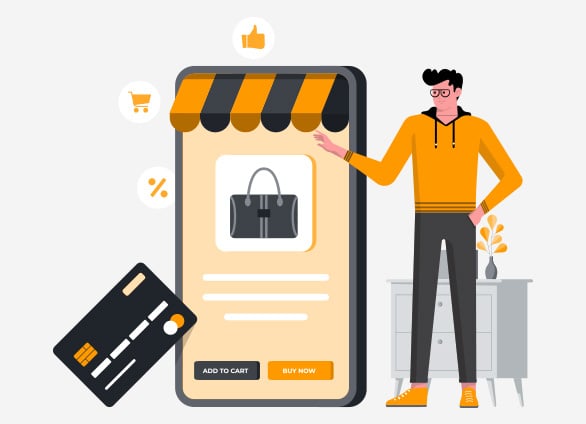Is Starting an E-commerce Business a Profitable Idea?

Why would starting an online business be a lucrative move for you? Quite simply, an online business start-up is easy to research as you choose your product or service, easy to outsource as you team up with suppliers, and easy to scale as you grow your demand.
You’ve heard success stories about e-commerce businesses and are now wanting to start an e-commerce business yourself. But you’re not 100% sure what it involves and whether it’s even a good idea. Let’s dive in and assess.
An e-commerce business involves using the internet to buy and sell goods and services. In South Africa, e-commerce businesses that involve setting up an online store are becoming the smart choice if you’re exploring options on how to start a business from scratch with no money.
A study by Deloitte's found that 70% of South Africans shop online at least once a month, and recent statistics coming out of FNB Merchant Services state that SA’s ecommerce industry is nearly R200 billion a year and is predicted to swell to R225 billion by the year 2025.
SA’s president Cyril Ramaphosa has addressed the urgency of lowering data costs for young South Africans so that they can seek “learning and earning opportunities”, and the lockdown did well to fast-track e-business culture as South Africans were forced into starting online businesses from their home. As a country, we’re moving online fast.
As you sit Googling ‘how to start a small business online’, the amount of data and advice online might be overwhelming, so let’s take it step by step.
How to Set Up Your Own E-Commerce Business

In this section, we’ll explore how to set up an e-commerce business in more detail.
Decide on a product or service to sell
Start with brainstorming something unique to your area that the rest of the world would pay good money for, or think about a hobby or passion of yours that you can market online.
Home Grown Africa is a good example of an e-commerce business supporting local makers rather than importing overseas clothing, as they make and sell exquisite Africa-themed children’s clothing via an aesthetically pleasing e-commerce store.
Moving On offers you the chance to buy second-hand goods online at a fraction of their normal price, as South Africans are looking to sell the contents of their homes in a hurry.
You can also tout your services as a driver, virtual assistant, babysitter, dog walker, shopping tourist guide… you name it.
Find out more: Need funding? Check out our guide on small business grants.
Choose your e-commerce business model
Models include:
- B2B: Business to Business e-commerce, where both businesses are exchanging products or services online.
- B2C: Business to Consumer, where businesses sell directly to consumers.
- C2C: Consumer to Consumer, where there is an online intermediary who takes a cut.
- C2B: Consumer to Business, where the consumer provides a service to a company or organization.
If you started blogging about South African township food, for example, you might share an affiliate link to an ordering company like Order Kasi in exchange for a slice of their revenue from customers you send their way. This would be an example of C2B.
Choose your e-commerce delivery model
Dropshipping
Dropshipping is the buzzword if you want to start an e-commerce business as it allows for delivery from the manufacturer directly to the customer. Building an online store using this formula allows you to connect the buyer to the seller with a payment gateway setup, a reliable courier, and minimal startup cost.

If you’re exploring how to create an online store for free, this gives you options as you don’t need to worry about the costs of warehousing. Also, by outsourcing all your staffing headaches (such as increased hours over busy periods like Black Friday and Christmas), you get to play the silent middle man and focus your efforts on assessing online demand.
With an online store name, your online startup business is starting to take shape and to other businesses out there you present as the real deal – meaning you can ask for wholesale prices if you are looking to sell goods. Aim to build in a markup of at least 45% as you set competitive pricing.
White labelling
White labelling is when you ask the manufacturer to use your branding instead of their own, allowing the end consumer to believe that they’re buying your product in its entirety (leading food brand NOMU offers white label development services, for example). White labelling presents a fantastic growth opportunity in the FMCG space, as identified by Investec.

Private labelling
Private labelling occurs when a retailer specifies how a product is made and how it looks. You pay to have it produced and delivered to your online store.

NielsenIQ has identified strong private label growth (nearly 255 average of total basket value) since lockdown. They also attribute the growth to a changing consumer perception that these private labels are more than just the ‘no name brands’ of old.
This is great news if you’re looking at how to start your own brand online: create an online store free, and get your product, pricing, and branding right – and you’re on your way to a successful e- business!
Subscription-based

The goose that lays the golden egg – especially when it comes to selling services – is the subscription-based model. Here you charge an affordable monthly minimum for your curated cooking lessons, yoga classes, or podcast episodes. Earn passive income monthly, or go viral and get rich quick!
Conduct research on your competitors
Before you start an e-commerce business, your online research should extend to seeing what the competition is up to as they’ll provide insights on pricing and how to market your product or service in an original way.
Understand your target audience
Next, you should spend time understand your ideal target market. These are the buyer personas that are likely to support you. When you have a picture of them in mind, it makes selling to them much easier, as you’ll familiarise yourself with their personal, social, and cultural influences.
Your e-commerce business plan
A solid e-commerce business plan is what you need to pin all your ideas and numbers down, and there are free template examples that you can adapt to suit your needs.
How to Fund Your E-commerce Business

If you’re looking for funding for your exciting new e-commerce business, we have tailor-made guides available on our site.
We have a small business grants guide offering province-specific portals that have grants available if you’re looking to scale your business without the pressure of repaying a loan.
Alternatively, we have a guide on small business loans with great advice on negotiating finance terms and the feasibility of buying an existing business versus figuring out how to start a business from scratch.
How to Build Your E-commerce Website
Learning how to start an online business involves registering your business in SA through CIPC, or a financial institution such as a bank.
People will be quick to copy your idea, even while you are building an online store, so registering your trademark or logo design at the same time as you register your company makes smart business sense.
Choosing an e-commerce website builder and payment gateway
The e-commerce platform that you use needs to accept rands as payment, so here you’re looking at Shopify, WordPress, and WooCommerce as your top three options.
Payfast or Paygate are viable payment gateway options if you are accepting payment via PayPal or international payments.
Payfast is an example of an online payment platform that will integrate easily with your e-commerce shopping platform (such as Shopify), and the good news is that you can link it to your personal bank account, meaning you don’t have to wait to get a business registered.
Choosing a CMS software
The Content Management System you choose allows you to build a website without having to code it. There are multiple CMS options available, but Shopify stands tall if you want to learn how to make an online store with only a basic understanding of how websites work.
The beauty of a good CMS lies in its simplicity, as it allows you to focus on how to start your own brand and how to open your own business in a competitive online market without getting bogged down by technical issues.
Depending on whether you’re offering a product or service, and whether your e business is image-heavy or niche-specific (i.e. podcasting), will determine the CMS you use.
Order fulfilment providers
Order fulfilment providers are a great way for entrepreneurs to delegate certain tasks, especially managing stock. ‘3PL’ stands for third-party logistics. These are companies that take the pain out of warehousing headaches and delivery hassles.
For example, an online ice-cream store may want to use a 3PL that offers temperature controlled storage facilities.
How to Advertise Your E-commerce Website
So you’ve figured out a relatively easy business to start at home, and now you need to market your ecommerce store.
Social media is organic and it’s free – so this is where you start by posting regularly about your product or service offering, including the right hashtags, and asking your friends and family to spread the word.
Influencer marketing is an extension of this. You might offer Instagram influencers (i.e. people with lots of followers) to test out your product by sending them a free sample. If you have a podcast, then getting guests and hosts from other shows as a way to cross-pollinate and grow your audience is a common practice.
Pay-per-click (PPC) is associated with first-tier search engines, and here you will pay per click if your online ad is actually clicked on. Google AdSense is an example of a PPC if you’re exploring ways to earn money from your site or spend money to buy traffic to it.
Similarly, SEO (search engine optimisation) allows you to research your competitors, build quality backlinks (links from other sites to yours), and find traffic-driving keywords that all enhance your ranking results in the search engine algorithms.
SEO is a must for any ecommerce business looking to finetune its offering as the months go by. And the trick is to launch as soon as you can, and then iterate (repeat and improve) your online offering as you learn about customer demand and your fulfilment capacity.
Find out more: Need more advice on this sector? Read our sector-specific articles.
Starting an E-commerce Business Is Not Your Only Option
If the list of things needed to start a business is starting to add up and you’re wanting a simpler opportunity to work from home (or indeed anywhere in the world), then why not consider buying an existing e-commerce business?
We have several appealing e-commerce businesses for sale on our site.
Now that you know more about how to start an online business in South Africa and which business is easy to start, you can take that knowledge and pair it with your business ambition and start your online business. Good luck!
If you would like more advice on how to buy a business, then our comprehensive guide will help you decide on which sector to enter.
Your online entrepreneurial journey is now well underway. Remember, information is power. The more you research online, the better equipped you’ll be to make the right decision and the fewest mistakes.
As always, we are available to you if you need help learning more about a particular business opportunity. Feel free to contact us at any time.




